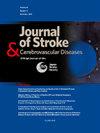Preexisting dementia is not independently associated with short-term functional outcomes in acute anterior ischemic stroke with atrial fibrillation on oral anticoagulant therapy: A sub-analysis of the prospective analysis of stroke patients taking oral anticoagulants (PASTA) study results
IF 1.8
4区 医学
Q3 NEUROSCIENCES
Journal of Stroke & Cerebrovascular Diseases
Pub Date : 2025-08-15
DOI:10.1016/j.jstrokecerebrovasdis.2025.108425
引用次数: 0
Abstract
Background
The incidence of patients with stroke and preexisting dementia (PED) increases with age. This study aimed to elucidate the unclear relationship between PED and functional outcomes of acute ischemic stroke (AIS) and atrial fibrillation (AF).
Methods
We analyzed data from 493 patients (median age, 80 years; 43.0 % women) with AF and acute anterior circulation stroke taking oral anticoagulants enrolled in the multicenter prospective analysis of stroke patients taking oral anticoagulants (PASTA) study. Poor outcome was defined as a modified Rankin scale (mRS) score of 3–5 or 6 (death). We compared clinical characteristics between the PED and non-PED groups and assessed PED’s impact on stroke outcomes.
Results
Patients with PED (17.4 %) were old (p < 0.0001) and had a high incidence of congestive heart failure (p < 0.001), increased disease severity at onset (p = 0.0015) and discharge (p < 0.001), and increased frequency of poor functional outcomes (80.2 % vs. 57.0 %; p < 0.0001). Multivariate analysis revealed that age (odds ratio [OR],1.05; 95 % confidence interval [CI], 1.01–1.09; p = 0.0261), pre-stroke mRS score (OR, 2.02; 95 % CI, 1.57–2.59; p < 0.0001), and the initial National Institutes of Health Stroke Scale score (OR, 1.21; 95 % CI, 1.16–1.26; p < 0.0001) were associated with poor outcomes, but PED was not (OR, 1.80; 95 % CI, 0.79–4.13; p = 0.1630).
Conclusions
PED showed no independent association with poor discharge outcomes in patients with AIS and AF after adjusting for baseline characteristics, pre-stroke dependency, initial stroke severity, or stroke management.
Registration
https://upload.umin.ac.jp/cgi-open-bin/ctr_e/ctr_view.cgi?recptno=R000034958; unique identifier: UMIN000030877
口服抗凝剂治疗的急性前路缺血性卒中合并房颤患者,既往痴呆与短期功能结局不独立相关:口服抗凝剂(PASTA)研究结果对卒中患者前瞻性分析的亚分析。
背景:卒中合并既往痴呆(PED)患者的发病率随着年龄的增长而增加。本研究旨在阐明PED与急性缺血性卒中(AIS)和心房颤动(AF)功能结局之间的不明确关系。方法:我们分析了493例房颤和急性前循环卒中口服抗凝剂患者(中位年龄80岁,43.0%为女性)的资料,这些患者参加了卒中患者口服抗凝剂的多中心前瞻性分析(PASTA)研究。不良预后定义为改良Rankin量表(mRS)评分为3-5或6分(死亡)。我们比较了PED组和非PED组的临床特征,并评估了PED对卒中结局的影响。结果:PED患者(17.4%)年龄大(p < 0.0001),充血性心力衰竭发生率高(p < 0.001),发病时疾病严重程度增加(p = 0.0015),出院时疾病严重程度增加(p < 0.001),功能不良结局发生率增加(80.2% vs. 57.0%; p < 0.0001)。多因素分析显示,年龄(优势比[OR],1.05; 95%可信区间[CI], 1.01-1.09; p = 0.0261)、卒中前mRS评分(OR, 2.02; 95% CI, 1.57-2.59; p < 0.0001)和美国国立卫生研究院卒中量表初始评分(OR, 1.21; 95% CI, 1.16-1.26; p < 0.0001)与预后不良相关,但PED与预后不良无关(OR, 1.80; 95% CI, 0.79-4.13; p = 0.1630)。结论:在调整基线特征、卒中前依赖性、初始卒中严重程度或卒中管理后,PED与AIS和AF患者出院后的不良结局无独立关联。注册:https://upload.umin.ac.jp/cgi-open-bin/ctr_e/ctr_view.cgi?recptno=R000034958;唯一标识符:UMIN000030877。
本文章由计算机程序翻译,如有差异,请以英文原文为准。
求助全文
约1分钟内获得全文
求助全文
来源期刊

Journal of Stroke & Cerebrovascular Diseases
Medicine-Surgery
CiteScore
5.00
自引率
4.00%
发文量
583
审稿时长
62 days
期刊介绍:
The Journal of Stroke & Cerebrovascular Diseases publishes original papers on basic and clinical science related to the fields of stroke and cerebrovascular diseases. The Journal also features review articles, controversies, methods and technical notes, selected case reports and other original articles of special nature. Its editorial mission is to focus on prevention and repair of cerebrovascular disease. Clinical papers emphasize medical and surgical aspects of stroke, clinical trials and design, epidemiology, stroke care delivery systems and outcomes, imaging sciences and rehabilitation of stroke. The Journal will be of special interest to specialists involved in caring for patients with cerebrovascular disease, including neurologists, neurosurgeons and cardiologists.
 求助内容:
求助内容: 应助结果提醒方式:
应助结果提醒方式:


